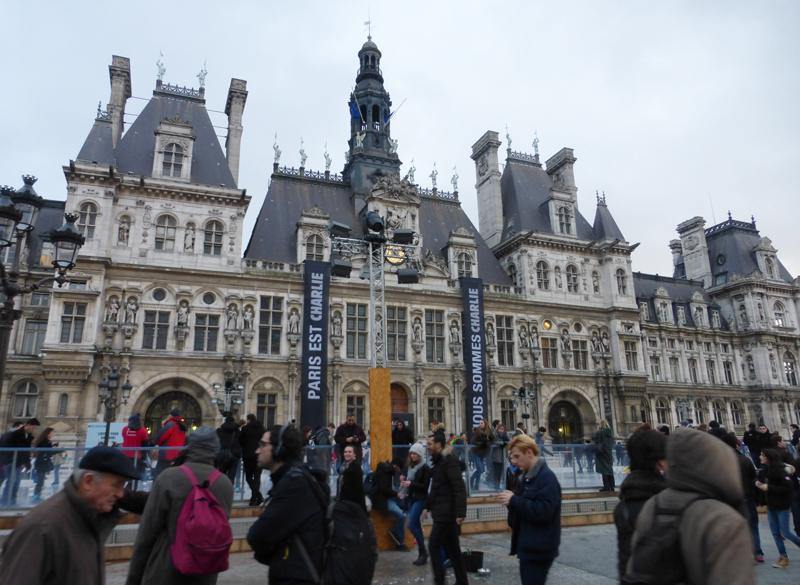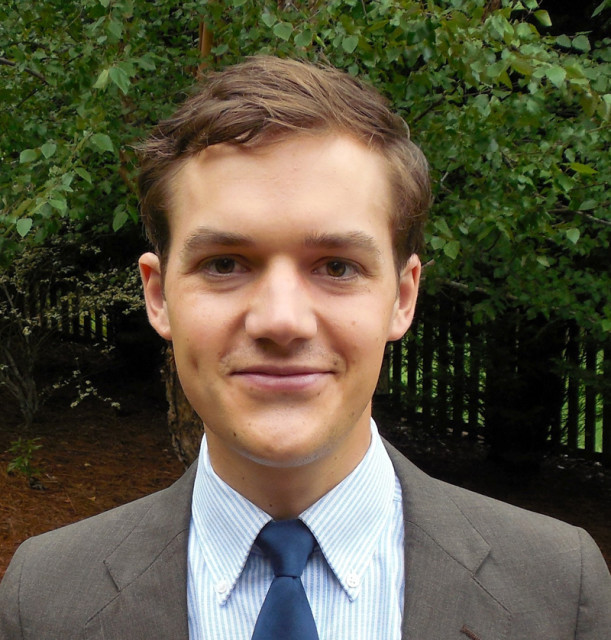(RNS) The aftermath of the Charlie Hebdo shootings has recently moved from the streets of Paris to the classrooms of France, where teachers, students and policymakers confront religion and free speech.
The Charlie Hebdo cartoons and January’s subsequent rally of support for the satirical magazine revealed France’s full support for freedom of expression. This freedom includes satire: portraits mocking Muhammad, sometimes clothed, sometimes nude. But while France shares an enthusiasm for “free speech” found among other nations, it lacks one aspect of culture found in most countries: religious education.

Banners hang on Paris City Hall supporting Charlie Hebdo. Religion News Service photo by Elizabeth Bryant
With empty churches and a school curriculum that excludes religion, France does not educate its citizens about religion. Instead, the French champion secularism, or “laicite,” most simply the separation of religion and societal institutions.
The secularism campaign within France’s education system officially began in 1882, when Jules Ferry established cost-free but also religion-free schooling. In 1905, the state denied sanction of religion, crippling the Catholic Church and confirming the secular stance of France. The country chose not to amend the separation of church and state in 2005, a secularization of society and schools that continues today.
In 2013, the Secularism Charter banned expression of religion in French schools, further distancing the classroom from religious conviction. The country still prohibits religious teaching in school, and while private, religious institutions do exist, only the region of Alsace-Moselle offers religious education. It also harbors the only university program in theology, at the University of Strasbourg.
In pre-university schooling, the average student in France would receive no religious education, whether tolerant, liberal, conservative or extremist.
Religious education looks quite different in other countries. England’s pre-university exam, the GCSE, contains a section on world religions, with proposals to expand the requirements in 2016. In response to “radicalism,” the chairman of the National Association of Teachers of Religious Education, Ed Pawson, claimed, “Good religious education has never been more needed.”
The Republic of Ireland also includes religion as a part of its examination, while Finland, Pakistan, Turkey and Austria — the latter two themselves secular states — mandate religious education in public schools, offering an “ethics” option as an alternative. Germany, Poland and Romania offer religion courses as optional. Other countries have banned religion from the curriculum, including China, Japan and the United States. The latter permits an “academic perspective” on religion, but at face value, it seems to resemble France.
Recently in Phoenix, more than 200 protesters lambasted Muslims outside an Islamic community center. The exercise in free speech was met with hundreds of objectors from various religious and community groups. Compare this with Generation Identitaire, a French nationalist group opposing Islamic immigration that continues to grow, seemingly without civil opposition. While the comparison is more suggestive than conclusive, Americans do receive religious education from churches, other religious organizations and family traditions. They do not champion France’s brand of secularism in schools.
France gleans no education from its churches. Despite the nominal religious affiliation of many French citizens, the nation holds some of the lowest rates of church attendance in the world. At the Catholic University of Lyon, a dozen students, including Muslims and government officials, have gathered to learn about religion and secularism. Despite this small step in instruction, France seems to be one of the most religiously uneducated countries on the globe.
Is this significant for the events surrounding Charlie Hebdo?
While some might interpret the magazine’s action as free speech, others might argue that Charlie Hebdo endangered innocent citizens by prompting an attack after repeated warnings. In either case, the free expression occurred in a society largely uneducated on religious issues.
Would religious education have altered the response of the French people? Might it have tailored the cartoons in Charlie Hebdo? Would it have stopped the Kouachi brothers?
Teachers in other countries promote religious education as a boon for society. On the one hand, eradicating the subject from schools nurtures religious ignorance. On the other hand, teaching religion in schools can fall prey to devotional exercises. But it need not. Religious education can help a society understand the motives of religious members, the wise and foolish methods of communicating with them and the appropriate responses to societal problems.

Arthur Keefer is an American doctoral student at the University of Cambridge, where he is studying the Hebrew Bible. Photo courtesy of Arthur Keefer
A week after the shootings, French President Francois Hollande claimed that, whenever he travels, he reminds people that “Islam is compatible with democracy.” Later that month, his teachers noticed a problem in their schools: One “realized that the basic notions of tolerance and freedom of expression are not so obvious to our students.” Presidential promises and classroom reality do not cohere. In the aftermath of Charlie Hebdo, France must question the quality of its “free speech” and account for religious education.
(Arthur Keefer is an American doctoral student at the University of Cambridge, where he is studying the Hebrew Bible.)
YS END KEEFER




